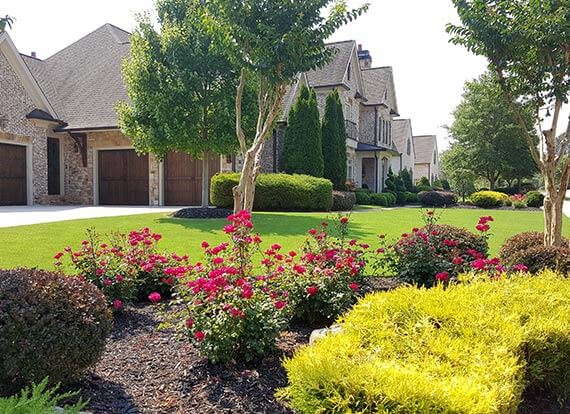
The best approach to nurturing a healthy, beautiful landscape is to work with nature, not against it. More and more homeowners are realizing this and embracing environmentally friendly ways to keep their gardens bountiful and lawns looking great.
While the eco-friendly toolkit is chockfull of ways to enhance your landscape and protect the environment, it’s always best to start by taking just a few simple actions. Once these become second nature, you can begin adding new ones. Three smart, easy steps for kicking off your eco-friendly journey are conserving water, composting, and choosing organic lawn care.
Conserving Water
Capturing rainwater and irrigating lawns and gardens in the morning go a long way in conserving one of our most precious natural resources.
Capturing Rainwater: Among the various systems for collecting rainwater, most homeowners start with rain barrels because they are readily available and relatively inexpensive. Typically, the barrels are used to capture rainwater runoff from roofs.
This is especially environmentally friendly because it reduces the amount of pollutants from roofing materials that end up in the water supply. However, because of these contaminants, it’s best to reserve this water for irrigating ornamental plants, not those you plan to eat. This might seem like a downside, but there’s actually another benefit. As the water travels through the soil and is taken up by the ornamentals, it’s filtered and purified. So you’re not just conserving water – you’re cleaning it, too.
Irrigating Your Lawn: The best time to water your lawn and garden is before 10 am. After that, when the sun and heat rev up, much irrigation water is lost to evaporation, meaning less water gets into the soil and down to the roots of your grass and plants.
Why not just water late in the evening or at night? This leaves grass and plants too wet, making them more susceptible to fungal diseases. When watering in the morning isn’t possible, the next best time is around 4 pm.
Composting
Think of composting as your home recycling program. At its most basic, it turns plant matter from the kitchen into a valuable, beneficial soil amendment. There are as many approaches to composting as there are people who compost, but, again, it’s best to start by keeping it simple.
The bare essentials are:
- A nitrogen component, such as fresh yard waste or non-animal food scraps (eggshells are fine, but no other animal products)
- A carbon component, such as dead, dried yard waste, shredded cardboard and newspaper, or sawdust
- Air, which is absolutely necessary for all the material to break down and transform into compost. Without sufficient air, your pile will turn into a smelly, unusable mess that churns out methane, one of the most potent greenhouse gases.
The compost that you and nature made can be added to the garden as a top dressing that enriches soil and helps it retain moisture. And you also kept all that so-called waste out of a landfill, where it pollutes the air, water, and ground.
Choosing Organic Lawn Care Products
There are more organic lawn care options available than ever before, even at big-box stores. The benefits of choosing organic fertilizers, pesticides, fungicides, and herbicides include:
- Reduced toxicity: Organic products are a safer alternative for beneficial creatures like bees and soil microbes – and, of course, for kids and pets!
- Faster breakdown: Organic products break down relatively quickly, so pollution due to runoff is not a concern.
If you’re not looking to become an expert in Atlanta lawn care, you can skip the DIY approach and call on an organic lawn care company. Either way, you’ll be making your landscape more eco-friendly.

